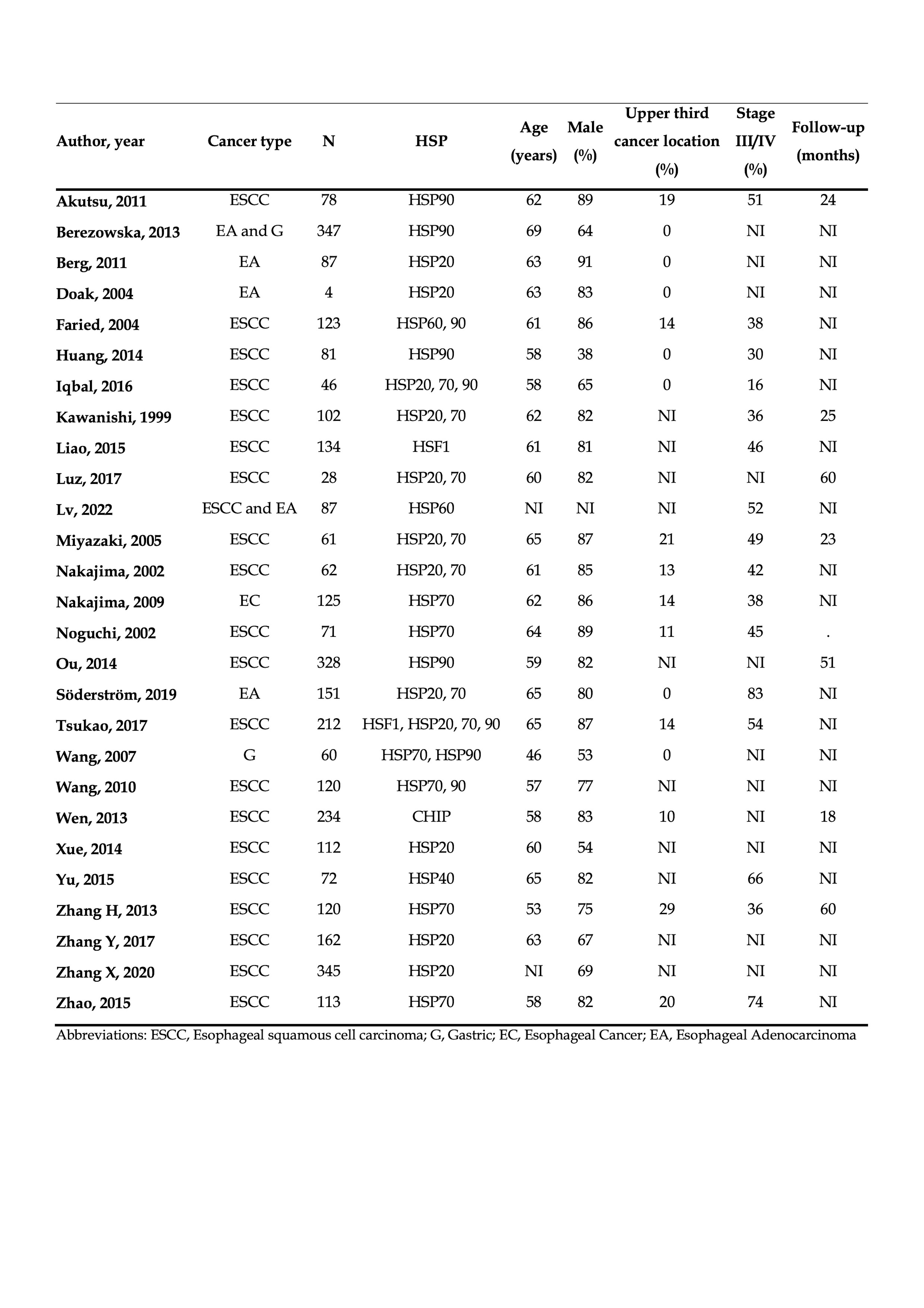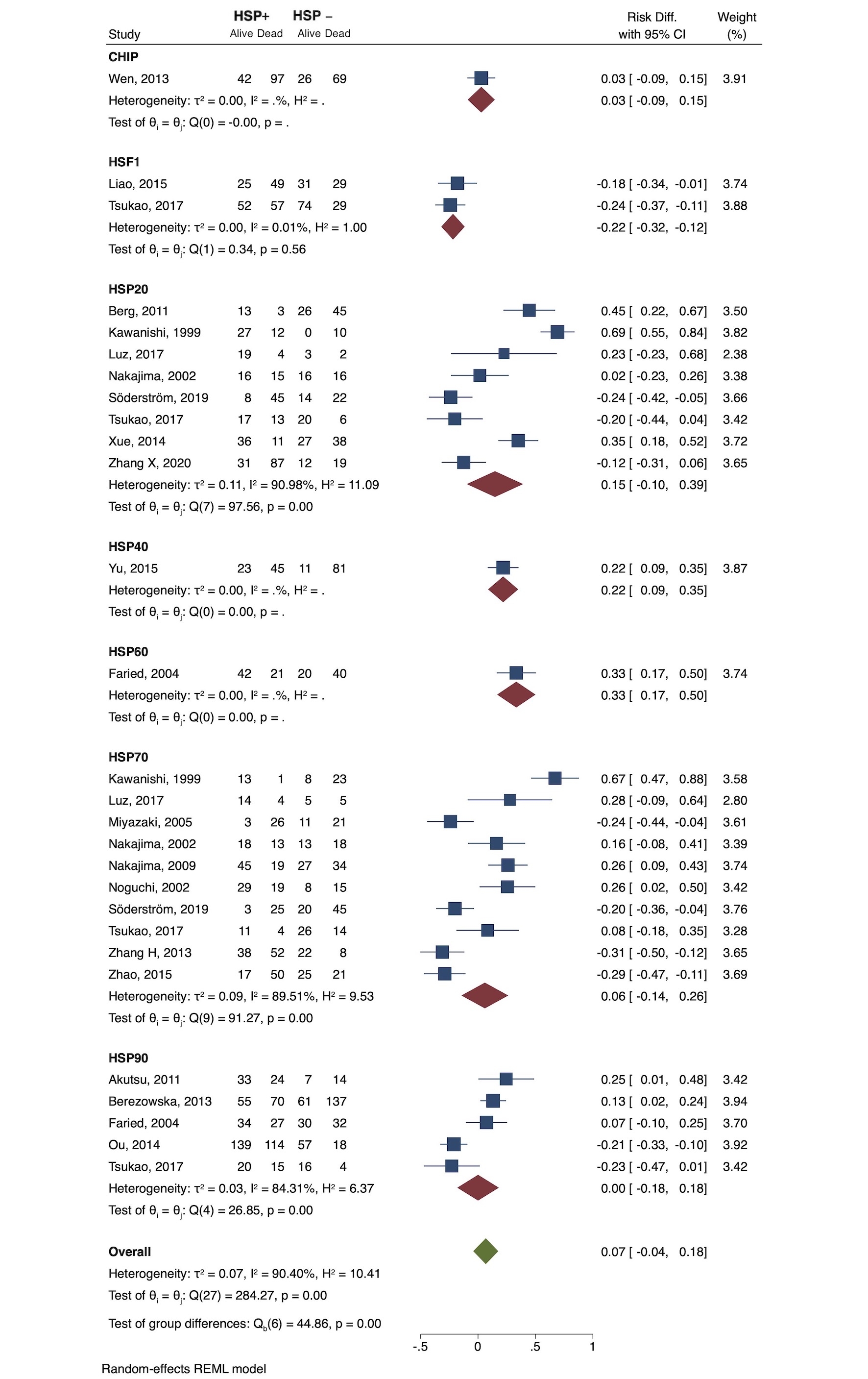Back to 2024 Abstracts
THE ROLE OF HEAT-SHOCK PROTEINS IN ESOPHAGEAL CANCER PROGNOSTICATION. A SYSTEMATIC REVIEW AND META-ANALYSIS
Eric T. Nakamura
1, Amanda Park
1,2, Marina A. Pereira
1, Daniel Kikawa
1, Daniel J. Szor
1,3, Francisco Tustumi
*1,31Universidade de Sao Paulo Faculdade de Medicina, Sao Paulo, São Paulo, Brazil; 2Centro Universitario Lusiada, Santos, SP, Brazil; 3Sociedade Beneficente Israelita Brasileira Albert Einstein, Sao Paulo, São Paulo, Brazil
Introduction: Heat Shock Proteins (HSPs) are molecular chaperones that play an important role in intracellular proteostasis, apoptotic control, and protection against different stress events and have been reported to be overexpressed in many cancers, including the esophagus and stomach. The prognostic significance of HSPs and their regulatory factors, such as HSF1 and CHIP, are poorly understood. To address this gap, we conducted a meta-analysis investigating the relationship between HSP expression and prognosis in esophageal cancer.
Methods: A systematic review was conducted in accordance with PRISMA recommendations (PROSPERO: CRD42022370653), on Embase, PubMed, Cochrane, and LILACS. Cohorts and cross-sectional studies of patients with esophagus or esophagogastric cancer were included. HSP-positive patients were compared with HSP-negative, and the endpoints analyzed were grade of differentiation, lymph node metastasis, tumor depth, distant metastasis, and overall survival. HSPs were stratified according to the HSP family, and the summary risk difference (RD) was calculated using a random-effect model. Statistical heterogeneity was calculated using I2 statistic.
Results: The final selection comprised 27 studies, including esophageal squamous cell carcinoma (21), esophagogastric adenocarcinoma (5), and mixed neoplasms (1). The pooled sample size was 3465 patients, with a mean age of 60.7 years old (range: 46-69). HSP40 and 60 were associated with a higher 3-year overall survival (HSP40 RD: 0.22; 95%CI: 0.09 to 0.35; HSP60 RD: 0.33; 95%CI: 0.17 to 0.50), while HSF1 was associated with a poor 3-year overall survival (RD: -0.22; 95%CI: -0.32 to -0.12). The other HSP families were not associated with long-term survival. HSF1 was associated with a higher probability of lymph nodal metastasis (RD: -0.16; 95%CI: -0.29 to -0.04). HSP40 was associated with a lower probability of lymph nodal dissemination (RD: 0.18; 95%CI: 0.03 to 0.33). The expression of other HSP families was not significantly related to lymph nodal metastasis. HSPs were not related to tumor depth or distant metastasis. Besides, HSPs were not related to the grade of cellular differentiation.
Conclusion: Our study showed that the expressions of certain families of HSP, such as HSP40 and 60 and HSF1, are associated with long-term survival and lymph nodal dissemination in patients with esophageal cancer. These findings support the role of HSP in susceptibility, progression, and prognosis in esophagogastric cancer.

Baseline characteristics of the included studies

Overall survival, according to the HSP family. Higher expression levels of HSP40 and HSP60 (were related to a higher 3-year OS. Conversely, the presence of HSF1 was associated with a poor 3-year OS.
Back to 2024 Abstracts

